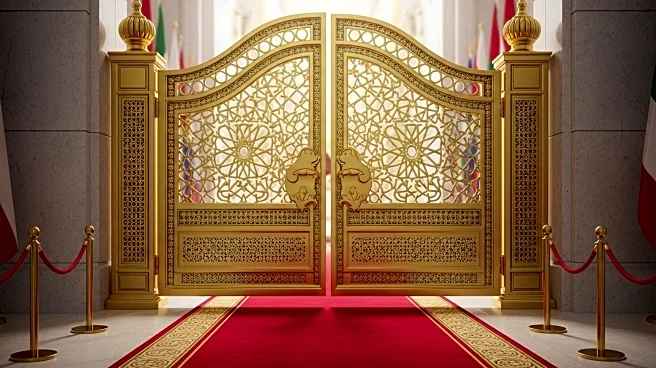What's Happening?
Turkish President Recep Tayyip Erdogan actively opposed Israeli Prime Minister Benjamin Netanyahu's attendance at a high-level summit in Egypt, according to a senior Turkish official. The summit, held at Sharm el-Sheikh, aimed to support the ceasefire in Gaza. Erdogan, who maintains ties with Hamas, was one of the signatories of a four-party declaration alongside U.S. President Donald Trump and leaders from Egypt and Qatar. Netanyahu initially accepted a last-minute invitation but later withdrew, citing a Jewish holiday. Turkish officials, including Omer Celik, spokesman for Erdogan's ruling party, confirmed Turkey's diplomatic efforts to prevent Netanyahu's participation, which gained support from other nations.
Why It's Important?
Erdogan's actions reflect ongoing tensions between Turkey and Israel, particularly regarding military actions in Gaza. The diplomatic maneuvering underscores Turkey's influence in regional politics and its commitment to supporting Palestinian interests. The summit's declaration, hailed by Erdogan as a step toward halting alleged genocide in Gaza, highlights the complex geopolitical dynamics in the Middle East. The exclusion of Netanyahu from the summit may affect future diplomatic relations and negotiations involving Israel, Turkey, and other regional players.
What's Next?
The summit's outcomes may lead to further diplomatic engagements aimed at stabilizing the region. Erdogan's stance could influence Turkey's future interactions with Israel and its allies. The reconstruction of Gaza, as mentioned by Erdogan, will require international cooperation and could become a focal point for humanitarian and political efforts. The situation may prompt reactions from other Middle Eastern countries, potentially affecting alliances and regional stability.
Beyond the Headlines
Erdogan's refusal to share a platform with Netanyahu highlights the deep-seated animosity and historical grievances between Turkey and Israel. The event underscores the ethical and cultural dimensions of international diplomacy, where personal and national ideologies can significantly impact political decisions. The summit's declaration may also influence public opinion and media narratives regarding the Israeli-Palestinian conflict.









